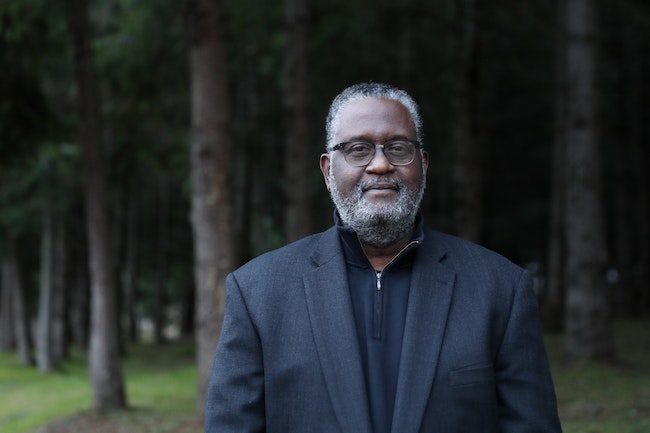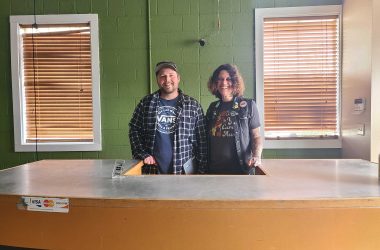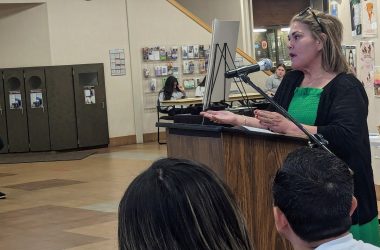
Reginald Richardson, the new president of the Salem-Keizer NAACP, poses for a portrait on Friday, Dec. 18. (Amanda Loman/Salem Reporter)
As Salem residents joined a nationwide call for racial justice over the summer, Reginald Richardson began thinking about changing the Salem-Keizer NAACP.
The branch issued statements, urging the school board to remove police officers from schools and moderated discussions with law enforcement leaders about their response to protests, but didn’t play a leading role in organizing the regular marches and rallies at the Capitol and in downtown Salem, which were often sparked by younger activists.
Richardson, 60, who’s been the vice president of the local branch since 2018, said he worried about its effectiveness and wanted to see the organization better poised to respond to community concerns.
“We’re not necessarily the go-to organization anymore for young African American activists. I certainly have been worried about that void and perception of our organization,” he said.
He decided to run for branch president, winning a November election against current president Benny Williams, who’s led the branch for a decade, and Greggery Peterson, a former branch president and the head chef at the Kroc Center. Richardson’s term begins in January.
The NAACP is the oldest civil rights organization in the U.S., founded in 1909 in response to widespread lynchings and violence against African Americans. It’s a nonpartisan group that today advocates for voting rights, criminal justice reform and an end to racial discrimination.
“Civil rights is not just a black, African-American thing. Civil rights are for all of us. If any of our rights are denied, it denies the rights of all human beings,” Richardson said.
Under Williams’ leadership, the chapter made education a major focus, pushing the Salem-Keizer School District to do more to boost graduation rates for Black students and address racial disparities in test scores, discipline and academic achievement.
Williams said he plans to stay involved in the chapter and is proud of the work he did to revive a chapter that struggled financially and had fewer members when he took over.
“It’s going to be interesting because he’ll have an opportunity, both financially and with membership, to do a lot more,” Williams said of Richardson.
Richardson came to Salem from Chicago in 2015 and got involved in the Salem-Keizer branch about a year later, when he met Williams at the city’s World Beat festival.
He holds a doctorate in social work from the University of Illinois and came to Oregon to head the Department of Human Services’ self-sufficiency programs following a national search. Now, he serves as executive director of Oregon’s Alcohol and Drug Policy Commission.
Richardson said the change from a bustling city like Chicago, where Black people made up a majority of his neighborhood, to Salem was jarring. It was months before he saw another Black person at the store.
“I was like, ‘Hey, wassup, how you doing?’ I was probably way too excited,” he said, laughing.
In the years since, Richardson said Salem’s Black population has grown, and he’s seen more people moving here and to Portland for jobs.
Richardson said the branch’s work will be guided by priorities members identified in a recent survey, which include criminal justice, education, youth involvement and race relations.
Policing was at the top of the list, and Richardson said he and many members are concerned about the presence of hate groups at recent rallies, and the way police have sometimes responded in riot gear to Black Lives Matter protests while doing little when armed Proud Boys gather in public places.
“The city administration has to make a clear and unambiguous statement that hate, that white nationalists, white supremacists, Proud Boys and their ilk are unwanted in the city. I mean, simple. That should be the first step,” he said.
Richardson said the branch’s early conversations with Salem’s new police Chief Trevor Womack have been promising.
“He’s given us his word that he will look into this. We fully expect that he will come back with an appropriate approach to this issue,” Richardson said. Womack has since released a public statement about the department’s responses to protests and saying he does not support racist speech.
Richardson plans to continue the branch’s strong involvement in education. Starting last fall, he co-chaired a task force with the Salem-Keizer School District to make recommendations on spending an expected influx of $35 million in school funding from the state.
“Our district has struggled with being able to effectively work with Black and brown kids. This extended distance learning I think just amplifies that difficulty,” he said. “You add that with the stress the kids are holding, with the stress their families are under. Kids worry about whether their mom and dads will be able to hold a job and meet rent.”
The branch currently has about 230 members, and Richardson wants to work on a plan to engage them better and grow the ranks. His target, ideally, would be for everyone in Salem to join. But he said being active and engaged on the issues people care about is key to that.
“My experience has been when the organization is actually doing something, people want to actually be a part of it,” he said.
Richardson said he still sees the hunger for change and racial justice that animated protests in Salem and across the U.S. over the summer. But he worries some allies eager to join in over the summer may faded away as the cost of advocating for racial justice becomes higher.
“I worry that the backlash that often comes with systemic change will wear people out. I think what we’ve seen with white nationalists and a selection of Salem is a backlash,” he said. “We have a very short attention span so I worry that our allies will tire. This issue will never be solved by simply Black folks sort of raising up and protesting. Our allies, folks of goodwill, have to stand up and carry this forward.”
Contact reporter Rachel Alexander: [email protected] or 503-575-1241.
WE GET SALEM THE FACTS. Covering your community with care and depth. Salem Reporter – fair, accurate, independent. Subscribe and support our local service.

Rachel Alexander is Salem Reporter’s managing editor. She joined Salem Reporter when it was founded in 2018 and covers city news, education, nonprofits and a little bit of everything else. She’s been a journalist in Oregon and Washington for a decade. Outside of work, she’s a skater and board member with Salem’s Cherry City Roller Derby and can often be found with her nose buried in a book.









